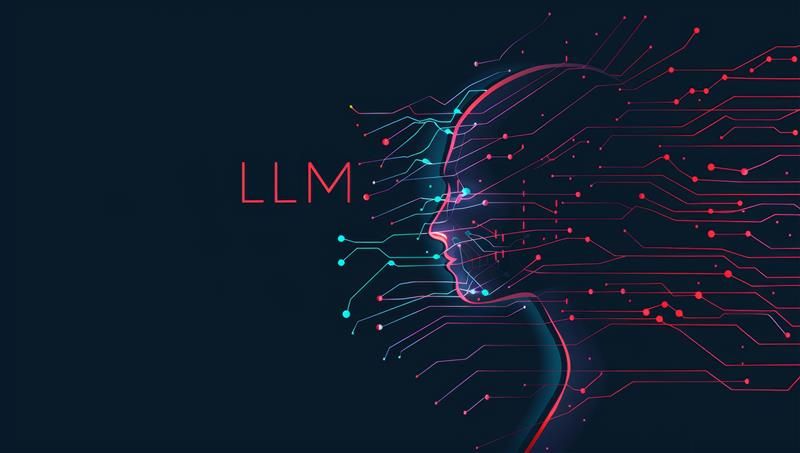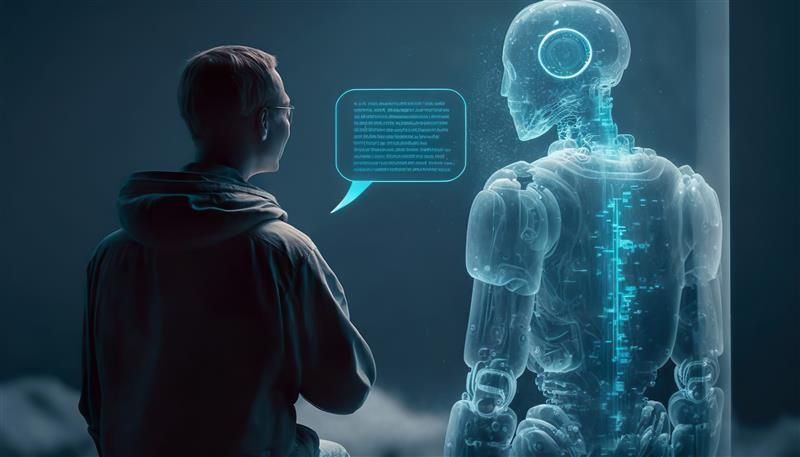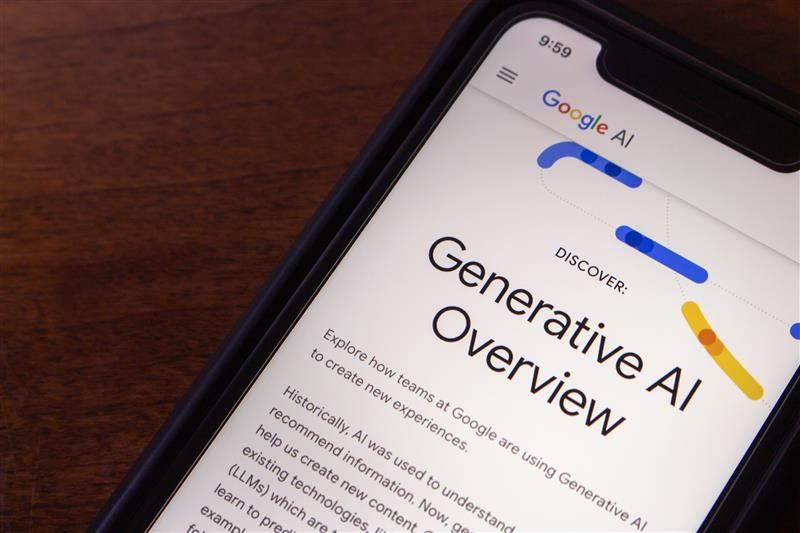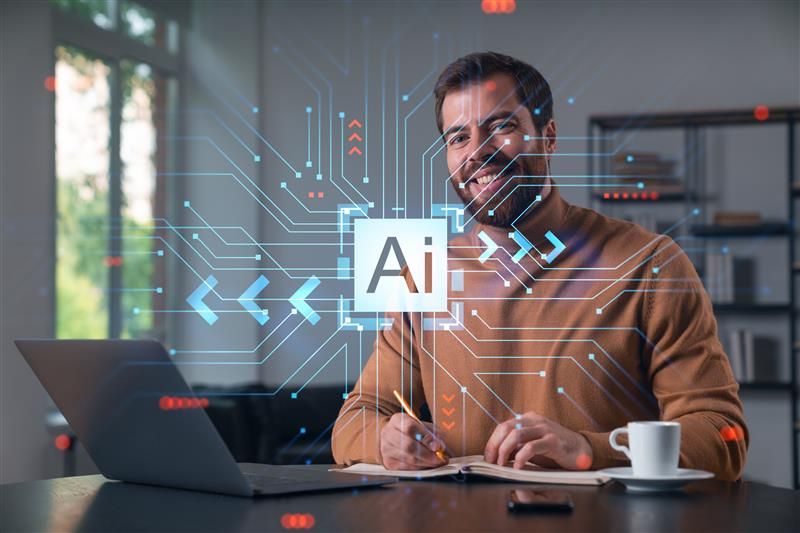Did you know that there are currently over 1.5 billion websites on the internet? With thousands of these sites offering similar products and services, standing out from the competition is becoming increasingly difficult. Gone are the days when traditional coding and debugging were enough to give your business an edge. Today, AI in web development is driving significant innovation and creativity in the industry. In this article, we will dive deep into how AI in web development is transforming the way websites are built, optimized, and maintained. We will also explore the powerful AI tools that can streamline your workflow, boost productivity, and deliver unparalleled customer experiences.
According to Statista, the global market for AI software is expected to grow at a staggering rate, with an estimated value of $126 billion by 2025. This incredible growth highlights the increasing importance of AI website development in the digital landscape.The rising demand for AI web developer roles is a testament to the growing need for businesses to integrate AI into their websites. This combination of AI in web development and smart design principles is quickly becoming essential for enterprises that want to stay competitive.
What is Artificial Intelligence (AI)?
Artificial Intelligence, commonly referred to as AI, is the simulation of human intelligence in machines. These machines are designed to perform tasks that typically require human cognitive functions such as learning, problem-solving, decision-making, and language understanding. In web development machine learning, AI systems are programmed to analyze vast amounts of data, learn from patterns, and make decisions based on this data to improve website performance and user interaction.
There are two main types of AI:
- Narrow AI (Weak AI): This type of AI is designed for specific tasks such as image recognition, virtual assistance, or recommendation systems. It’s the most prevalent form of AI in web development.
- General AI (Strong AI): A more advanced form of AI that aims to mimic human intelligence across various domains. While still theoretical, this form of AI holds immense potential for future applications in web development.
The Importance of AI in Web Development
The importance of AI in web development extends far beyond automation and efficiency—it fundamentally transforms how websites function and interact with users. By integrating AI in web development, businesses can harness the power of machine learning and data analysis to deliver highly personalized user experiences, tailored in real-time based on individual behavior and preferences. For instance, AI can analyze user activity to suggest relevant content, products, or services, improving both user engagement and satisfaction.
Moreover, AI enhances website performance through intelligent automation of tasks like bug detection, security monitoring, and SEO optimization, which reduces the risk of errors and ensures a seamless experience for users. Another key aspect is the ability of AI to handle large volumes of data with ease, providing valuable insights that can shape better business strategies and website improvements. AI tools can identify patterns, predict user needs, and optimize website layouts or interfaces to ensure the highest levels of functionality and user retention. Additionally, AI-driven customer support systems, like chatbots, provide real-time assistance and streamline communication, allowing businesses to engage customers more effectively without human intervention. In the era of AI web development, businesses that adopt AI can gain a competitive edge by delivering faster, smarter, and more engaging digital experiences.
The Advantages of AI in Website Development
The role of AI in web development continues to grow, offering numerous benefits that extend far beyond traditional approaches to building and maintaining websites. In addition to enhancing user experiences, boosting productivity, and enabling smarter decision-making, AI offers several other key advantages that are shaping the future of web development.
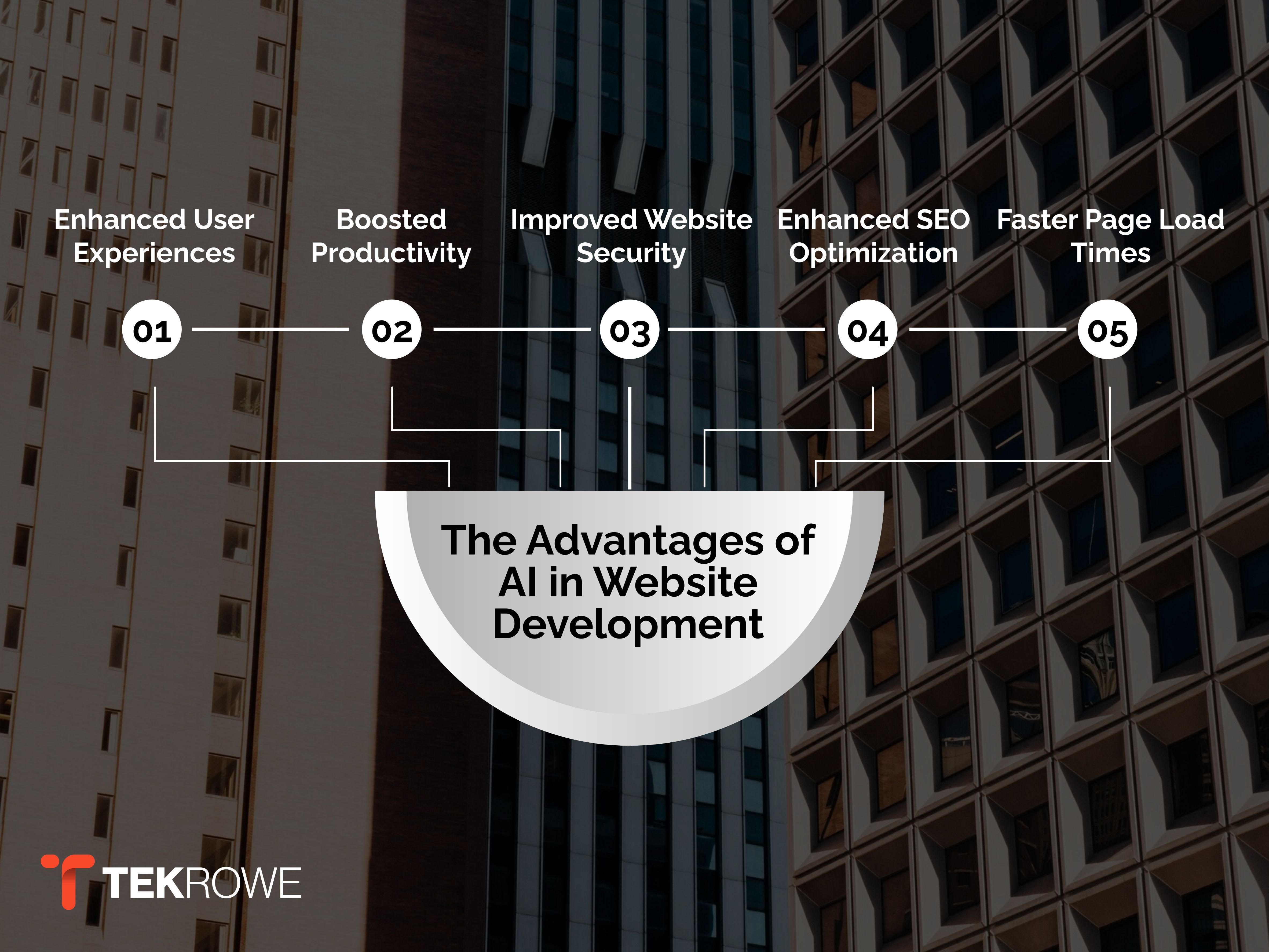
Enhanced User Experiences
One of the most significant advantages of AI in web development is its ability to create highly personalized and interactive user experiences. By analyzing vast amounts of user data, AI can identify behavioral patterns and preferences, enabling websites to tailor content and services specifically to each visitor. For example, AI-powered chatbots are now a staple on many websites, offering real-time customer support and guiding users through their journey without the need for human intervention. Similarly, recommendation engines powered by AI can analyze a user's browsing habits and suggest relevant products or content, significantly increasing the chances of conversion. This level of personalization leads to better engagement, higher satisfaction, and ultimately, improved customer loyalty.
Boosted Productivity
AI-driven automation is another major benefit that has transformed the way websites are developed. Traditionally, web development involves time-consuming tasks like code generation, testing, bug detection, and error correction. With AI, much of this routine work can be automated, allowing developers to focus on more creative and strategic aspects of the project. For instance, AI tools like GitHub Copilot can generate code snippets based on the developer’s input, speeding up the coding process and reducing human error. Automated testing tools can also run simulations to check for bugs or performance issues, ensuring a smoother and faster development cycle. This not only reduces development time but also cuts down on costs, making web development more efficient and scalable.
Improved Website Security
One of the most critical concerns in web development is security, and AI web development plays a vital role in enhancing website protection. AI-powered security systems can monitor websites in real time, identifying and responding to potential threats before they cause damage. Machine learning algorithms can detect unusual patterns, such as unauthorized access attempts or suspicious user behavior, and take automatic preventive measures. For instance, AI can quickly block harmful traffic, prevent data breaches, and analyze vulnerabilities in the code. With cyberattacks becoming increasingly sophisticated, AI in website development offers a robust solution for keeping websites secure.
Enhanced SEO Optimization
Search engine optimization (SEO) is essential for driving traffic to websites, and AI in web development is helping businesses improve their rankings on search engines. AI-driven tools can analyze search engine algorithms and user behavior to offer insights on how to optimize websites for better visibility. AI tools can also suggest keyword improvements, optimize meta tags, and even adjust website content to align with the latest SEO best practices. By leveraging AI, web developers and SEO professionals can ensure that websites rank higher in search engine results, leading to increased organic traffic and better business performance.
Faster Page Load Times
Website speed is crucial for user experience, and slow-loading pages can lead to high bounce rates and lost business. AI in web development helps to optimize website performance by analyzing factors that affect load times, such as image sizes, coding structure, and server response times. AI tools can automatically compress images, optimize server requests, and refine code, ensuring faster page load times. This not only improves user satisfaction but also positively impacts SEO rankings, as search engines like Google prioritize faster websites in their search results.
Advanced Testing and Quality Assurance
Quality assurance (QA) is a critical part of web development, ensuring that websites function correctly across different browsers, devices, and operating systems. AI has introduced advanced testing capabilities, allowing developers to automate various types of testing, including functional, performance, and security tests. AI-powered testing tools, like Applitools, use visual AI to detect even the smallest discrepancies between different versions of a website. This automation reduces the time spent on manual testing, speeds up the development process, and ensures that websites are thoroughly tested before they go live.
Personalization at Scale
Another key advantage of AI in website development is its ability to deliver personalization at scale. In today’s digital landscape, users expect personalized experiences that cater to their individual preferences. AI allows websites to dynamically adjust content, product recommendations, and user interfaces based on real-time data, such as a user’s previous interactions or current browsing behavior. This level of personalization helps businesses create more engaging experiences, leading to higher conversion rates and better customer retention. AI tools like dynamic content generators and recommendation engines can personalize each user’s experience, regardless of how many visitors are on the website at any given time.
Predictive Analysis and Future Planning
AI is not only about optimizing the present—it also helps businesses plan. Through predictive analytics, AI can analyze historical data and trends to forecast future user behavior, market demands, or potential challenges. This capability is invaluable for businesses that want to stay ahead of the curve. For example, predictive models can suggest when a website might experience higher traffic, allowing companies to prepare their infrastructure accordingly. AI can also predict which content or products are likely to resonate with future visitors, enabling businesses to continuously refine their offerings.
Automated Content Creation
Content is an essential part of any website, and AI in website development is making content creation faster and more efficient. With AI-powered tools like natural language processing (NLP), businesses can automate the creation of website content, such as product descriptions, blog posts, and even personalized email marketing campaigns. These AI tools can generate content that is not only grammatically correct but also tailored to the specific needs and interests of the target audience. This automation saves time, reduces costs, and ensures that websites always have fresh, relevant content to engage users.
Voice Search Optimization
With the rise of voice-activated devices like Amazon Alexa and Google Assistant, more users are searching the web using voice commands. AI in web development helps optimize websites for voice search, ensuring that they are discoverable through this increasingly popular medium. AI algorithms can analyze voice search patterns and help developers structure website content in a way that aligns with how users speak, rather than type. This ensures that businesses remain accessible to users who prefer using voice search, further enhancing their online presence.
Integration with AI-Driven Applications
As AI continues to evolve, it is becoming easier to integrate AI-driven applications directly into websites. This includes everything from AI-powered chatbots that provide 24/7 customer support to recommendation engines that suggest products based on user behavior. AI tools can also be used to power advanced search functions, allowing users to find what they need faster. By integrating these applications, businesses can create more interactive, responsive websites that offer a seamless user experience, leading to increased customer satisfaction and loyalty.
The Growing Role of AI in Web Development
The role of Artificial Intelligence (AI) in web development has been growing exponentially, reshaping the way websites are built, maintained, and enhanced. As digital transformation accelerates, businesses are increasingly adopting AI in web development to meet the evolving demands of users, optimize processes, and remain competitive. AI is no longer just a futuristic concept; it has become a critical component of modern web development, offering a range of benefits from personalized user experiences to more efficient development workflows.
AI's Expanding Influence on Web Development
The integration of AI into web development is transforming the industry in multiple ways. Initially, web development was a labor-intensive process that required significant manual effort, particularly in coding, debugging, and testing. However, with the advent of AI web development, many of these tasks have been automated, allowing developers to focus on more creative and complex aspects of website creation.AI tools are now capable of generating code, automating content updates, optimizing website layouts, and even predicting user behavior based on real-time data. This not only speeds up the development process but also significantly improves the overall quality of websites. As a result, AI is becoming an indispensable tool for developers and businesses alike, driving efficiency, innovation, and user satisfaction.
Key Areas Where AI is Growing in Web Development
1. AI-Driven Automation in Coding and Design
One of the most notable ways AI is impacting web development is through automation. AI tools like GitHub Copilot, for example, assist developers by generating real-time code suggestions, reducing errors, and speeding up coding tasks. These tools leverage machine learning to understand the context of the code being written and can suggest improvements or auto-complete lines of code. This automation drastically cuts down development time and ensures higher code quality. Similarly, AI-driven design tools like Wix ADI (Artificial Design Intelligence) are revolutionizing the design process by enabling even non-developers to create professional-grade websites. By answering a few simple questions, users can have a fully functional, customized website generated by AI, removing the need for manual coding or complex design processes.
2. Personalized User Experiences
Personalization has become a crucial factor in modern web development, and AI in web development is key to achieving this. AI algorithms can analyze user behavior in real-time, including browsing patterns, clicks, and previous interactions, to deliver personalized content, product recommendations, and tailored user experiences.For example, recommendation engines like those used by Amazon or Netflix are driven by AI. These engines analyze user preferences and suggest products, shows, or content that are most relevant to everyone. By integrating AI-driven personalization, websites can engage users more effectively, leading to higher conversion rates and improved customer loyalty.
3. AI in Website Testing and Debugging
Website testing and debugging are essential parts of web development, and AI-driven solutions are making these processes faster and more efficient. AI tools like Applitools use visual AI to automate testing, ensuring that websites display and function correctly across various devices, browsers, and screen sizes. These AI tools can identify and correct errors in real-time, significantly reducing the time developers spend on manual testing. Moreover, AI-powered testing platforms can simulate user interactions and stress-test websites, ensuring they perform well even under heavy traffic or unusual conditions. By automating these quality assurance tasks, AI in website development improves the reliability and performance of websites while freeing up developers to focus on innovation.
4. AI-Powered Chatbots and Virtual Assistants
AI-powered chatbots are becoming a standard feature on many websites, providing 24/7 customer support and improving user engagement. These chatbots, such as those built using ChatGPT or similar conversational AI models, can handle a wide range of customer queries, from answering FAQs to guiding users through the website. By integrating chatbots into websites, businesses can enhance user experiences without the need for constant human oversight. These chatbots can respond instantly to customer inquiries, offering personalized assistance based on the user’s browsing history and preferences. As AI technology continues to improve, chatbots are becoming more adept at understanding natural language and providing accurate, helpful responses.
5. AI-Enhanced SEO and Content Optimization
Search engine optimization (SEO) is another area where AI in web development is making a significant impact. AI-powered tools help businesses optimize their websites for search engines by analyzing keyword performance, tracking search trends, and suggesting improvements to website content. For example, AI tools can automatically generate meta tags, optimize images for faster loading, and even suggest content that is more likely to rank higher on search engines. This level of automation ensures that websites remain visible and accessible, attracting more organic traffic and improving overall site performance. Additionally, AI-driven analytics provide valuable insights into user behavior, allowing businesses to refine their content strategies for better engagement.
6. AI's Role in Predictive Analysis and Business Strategy
AI's ability to process large amounts of data allows it to perform predictive analysis, giving businesses the tools they need to anticipate user needs and market trends. For instance, AI can predict when website traffic will spike, enabling businesses to prepare in advance and prevent potential downtimes. AI can also suggest optimal times to launch new content or products based on historical user data, helping businesses make more informed decisions. This predictive power extends beyond just user behavior; AI can analyze market conditions, competitor actions, and industry trends to inform long-term strategies for website growth and engagement. As a result, AI in website development is becoming a critical factor in helping businesses not only improve their websites but also align their overall digital strategies with future trends.
7. AI in Enhancing Website Security
As cyber threats become more sophisticated, AI in web development plays a crucial role in enhancing website security. AI-powered systems can monitor websites in real-time, detecting unusual behavior patterns that may indicate security vulnerabilities or impending cyberattacks. These systems can automatically act, such as blocking suspicious IP addresses or alerting administrators to risks. Machine learning algorithms are particularly effective in identifying new types of threats, as they can learn from past incidents and improve their detection capabilities over time. By integrating AI-driven security measures, businesses can better protect their websites and user data, ensuring a safe browsing experience.
Need Help with Your Business
Contact Us NowTop AI Tools Shaping the Future of Web Development
The rise of AI in web development is transforming the landscape of how websites are designed, built, and maintained. AI-powered tools are enabling developers to create smarter, more efficient websites by automating tasks, enhancing user experiences, improving security, and providing insights based on data. Looking into the future, these tools are leading the charge in reshaping web development. Below is a detailed look at some of the most influential AI tools that are shaping the future of web development.
1. GitHub Copilot
GitHub Copilot is an AI-powered coding assistant developed by GitHub in collaboration with OpenAI. This tool leverages machine learning to provide developers with real-time code suggestions, enabling them to write code more efficiently. It can suggest entire lines or blocks of code based on natural language comments or existing code.
Key Features:
- Real-time code suggestions: GitHub Copilot suggests code as developers' type, reducing the need to search for solutions online. It understands the context of the project and provides relevant suggestions based on vast amounts of open-source code.
- Multi-language support: It supports a wide range of programming languages, including Python, JavaScript, Ruby, and more, making it versatile for different types of projects.
- Context-aware completions: The tool offers intelligent code completions that consider the surrounding code, helping developers avoid errors and write more concise, efficient code.
- Example: A developer working on a complex web application can type a comment describing a function they want to create, and GitHub Copilot will automatically generate the corresponding code. This significantly speeds up the coding process and minimizes potential mistakes.
2. Adobe Sensei
Adobe Sensei is Adobe’s AI and machine learning framework integrated into its suite of creative tools, including Photoshop, Illustrator, and Adobe Experience Manager. For web developers and designers, Adobe Sensei helps automate repetitive tasks, optimize content, and provide insights that enhance the overall user experience.
Key Features:
- Automated content tagging and cropping: Adobe Sensei can automatically tag, crop, and adjust images, saving time and effort for designers who work with large volumes of visual content.
- Personalized content recommendations: Sensei uses AI to analyze user behavior and preferences, providing personalized recommendations that help businesses deliver more relevant content to their website visitors.
- Predictive analytics: It offers insights into how users interact with content, allowing designers and marketers to optimize websites and campaigns based on data.
- Example: A web designer can use Adobe Sensei to automate the process of cropping images for a responsive website, ensuring that images are correctly sized for different devices without having to manually adjust each one. Additionally, the AI can provide insights into which design elements are resonating most with users.
3. ChatGPT
Developed by OpenAI, ChatGPT is an advanced conversational AI model that excels in natural language understanding and generation. It has become a powerful tool for web developers looking to integrate AI-driven chatbots, automate customer service, and even generate content for websites. ChatGPT can simulate human-like conversations, making it ideal for automating interactions with website visitors.
Key Features:
- Natural language processing (NLP): ChatGPT can understand and generate human-like text based on input, allowing it to engage in complex conversations with users.
- Content generation: It can be used to create website content, blog posts, FAQs, and even code snippets, making it a versatile tool for automating content creation.
- Customizable and integrable: ChatGPT can be easily integrated into websites, apps, and platforms, providing tailored responses based on user interactions.
- Example: A business can integrate ChatGPT into their customer service platform to handle common user inquiries, such as answering product-related questions or providing support. This allows businesses to provide 24/7 assistance without the need for human agents, improving efficiency and user satisfaction.
4. Wix ADI (Artificial Design Intelligence)
Wix ADI is an innovative tool that uses AI to automatically design and build websites based on user preferences. It asks users a series of questions about their business, design preferences, and goals, then generates a fully functional, professional website tailored to their needs. This tool is especially useful for non-technical users who want to create websites quickly and without the complexity of traditional web development.
Key Features:
- Automated design process: Wix ADI creates a website in minutes by analyzing the user’s preferences and content, providing a ready-to-use website.
- Customization options: Although the website is generated automatically, users can easily customize the design and content to fit their brand.
- SEO optimization: The tool ensures that the generated websites are SEO-friendly, improving the likelihood of ranking higher on search engine results.
- Example: A small business owner can use Wix ADI to quickly build a professional website by simply providing details about their business and choosing a design theme. The AI handles the rest, creating a fully functional website with minimal effort from the user.
5. Uizard
Uizard is an AI-powered design tool that allows users to quickly turn sketches, wireframes, or screenshots into interactive digital prototypes. It is designed for both non-designers and professionals, making it easy to create and iterate on designs for websites and mobile apps without extensive design knowledge.
Key Features:
- Sketch-to-design transformation: Uizard allows users to upload hand-drawn sketches, which the AI converts into digital prototypes.
- Drag-and-drop interface: Users can easily create user interfaces (UIs) using Uizard’s intuitive drag-and-drop editor, speeding up the design process.
- AI-powered suggestions: Uizard provides smart suggestions for design elements and layouts based on user input and trends.
- Example: A startup founder with limited design skills can sketch out a rough idea of their website layout, upload it to Uizard, and have it converted into a digital prototype. They can then refine the design using the tool’s drag-and-drop interface, significantly speeding up the prototyping phase.
6. Snyk
Snyk is an AI-powered security platform that helps developers identify and fix vulnerabilities in their code, dependencies, and containers. Given the growing importance of website security, Snyk provides an essential layer of protection, ensuring that codebases are secure and free from vulnerabilities.
Key Features:
- Automated vulnerability detection: Snyk scans code, dependencies, and containers to identify security vulnerabilities in real-time.
- Supports multiple languages: It works with a wide range of programming languages, including JavaScript, Python, and Java, among others.
- Real-time remediation: Snyk provides actionable insights and suggestions to fix security vulnerabilities, helping developers secure their websites during the development process.
- Example: A web development team can integrate Snyk into their continuous integration/continuous deployment (CI/CD) pipeline to automatically scan for vulnerabilities with each code update. Snyk alerts the team of any issues and suggests remediation steps to ensure the website remains secure throughout its development.
7. Applitools
Applitools is a visual AI-powered testing tool that automates the quality assurance (QA) process in web development. It ensures that websites look and function as intended across different devices, browsers, and screen resolutions. Applitools uses visual AI to compare a website’s current appearance with a baseline image, identifying even the smallest visual differences.
Key Features:
- AI-powered visual testing: Applitools automates cross-browser testing by comparing screenshots of websites across different platforms and devices.
- Cross-browser compatibility: It ensures that websites are visually consistent across various browsers, operating systems, and devices.
- Automated test management: Applitools can be integrated into CI/CD pipelines to automate visual testing, reducing the time spent on manual testing.
- Example: A web development team can use Applitools to test their website’s visual elements on multiple devices and browsers before launching. The AI will detect any visual inconsistencies, such as alignment issues or incorrect rendering, ensuring that the website is flawless for all users.
8. Canva
Canva is a popular design platform that uses AI to make professional-quality design accessible to everyone. It provides a drag-and-drop editor and thousands of customizable templates for creating web graphics, social media posts, and more. Canva’s AI features, such as automatic background removal and magic resize, simplify the design process for both professionals and beginners.
Key Features:
- AI-driven design tools: Canva’s AI features allow users to quickly edit images, resize graphics for different platforms, and remove backgrounds with a single click.
- Extensive template library: Canva offers thousands of templates for creating everything from website banners to social media posts, all of which can be easily customized.
- Collaboration tools: Canva supports real-time collaboration, making it easier for teams to work together on design projects.
- Example: A marketer can use Canva’s AI-driven design features to quickly create a series of promotional images for a new product launch. The tool’s AI can automatically resize the images for use on the company’s website, Instagram, and Facebook, saving time and ensuring consistency across all platforms.
9. Appy Pie
Appy Pie is an AI-powered platform that enables users to build mobile apps, websites, and chatbots without writing any code. This no-code platform is ideal for small businesses and entrepreneurs who want to quickly launch digital products without the need for technical expertise.
Key Features:
- Drag-and-drop app builder: Appy Pie allows users to create apps by simply dragging and dropping components, making it easy to build fully functional apps without coding.
- Cross-platform compatibility: Apps created with Appy Pie can run on multiple platforms, including iOS, Android, and web browsers.
- AI-powered chatbot builder: Appy Pie includes a chatbot builder that uses AI to create conversational agents for customer support and engagement.
- Example: A small business owner can use Appy Pie to create a mobile app for their store, complete with product listings and a chatbot for customer inquiries. The app is launched on both Android and iOS, expanding the business’s reach without requiring a dedicated development team.
10. Narrato Workspace
Narrato Workspace is an AI-enhanced platform designed to streamline content creation and collaboration for websites. It helps businesses plan, create, and optimize content for SEO and readability, making it an essential tool for content marketers and web developers focused on driving organic traffic to their sites.
Key Features:
- AI-powered content optimization: Narrato offers suggestions for improving the SEO and readability of content, ensuring that it is optimized for search engines and user engagement.
- Task management and content calendar: The platform helps teams manage content workflows, assign tasks, and track progress through an integrated content calendar.
- Collaboration features: Narrato Workspace allows teams to collaborate in real-time, making it easy to review and edit content together.
- Example: A content marketing team can use Narrato Workspace to create and optimize blog posts for a website. The AI analyzes the content for SEO best practices and provides recommendations for improving keyword density, readability, and overall engagement.
Final Thoughts
The integration of AI in web development is no longer a trend—it’s the future. By embracing AI website development and using AI web developers to build smarter, more personalized digital experiences, businesses can stand out in an increasingly crowded online space. As AI continues to evolve, we can expect even more advanced tools and technologies that will further enhance the capabilities of web developers. From automating repetitive tasks to providing data-driven insights, web development machine learning is set to revolutionize the way websites are created and maintained.
Ready to leverage AI for your next web development project? Contact Tekrowe today to discover how our expert team can integrate cutting-edge AI tools into your website, delivering innovation, performance, and an enhanced user experience. Let’s shape the future of your web presence together! By adopting AI, businesses not only gain a competitive edge but also ensure they can keep up with the ever-changing demands of digital users. So, whether you’re a seasoned developer or just starting, now is the time to explore the possibilities of AI in web development.
FAQs
What is AI in web development?
AI in web development refers to the integration of artificial intelligence technologies, such as machine learning, natural language processing, and data analysis, into the website creation and maintenance process. These AI tools help automate tasks, personalize user experiences, enhance security, and provide data-driven insights, making web development more efficient and user-friendly.
How does AI improve website development efficiency?
AI improves efficiency by automating routine tasks like code generation, debugging, testing, and security monitoring. AI tools like GitHub Copilot suggest code completions and functions, speeding up the coding process. Additionally, AI automates testing processes, like in Applitools, which checks for visual inconsistencies across different browsers and devices, reducing manual work and errors.
Can AI improve user experience on websites?
Yes, AI plays a key role in improving user experiences on websites. AI-powered chatbots, such as those using ChatGPT, can provide real-time customer support and answer queries 24/7. AI algorithms also analyze user behavior to personalize content, product recommendations, and website layouts, leading to more interactive and engaging experiences.
How does AI help in website security?
AI enhances website security by automatically detecting and addressing potential threats. Tools like Snyk continuously monitor code and dependencies for vulnerabilities and provide recommendations for fixing them. AI can also identify suspicious behavior patterns, such as unauthorized login attempts, and prevent cyberattacks before they occur.
How can AI improve website SEO?
AI helps improve SEO by analyzing large amounts of search data and optimizing content for search engine rankings. Tools like Narrato Workspace offer AI-powered content optimization suggestions to improve keyword density, readability, and overall, SEO performance. AI can also optimize meta tags, structure content more effectively, and predict future search trends to keep websites competitive in search rankings.
Is AI development only for large businesses?
No, AI in web development is accessible to businesses of all sizes. Many AI tools, like Wix ADI and Appy Pie, are designed for small businesses and non-developers, making it easy to create professional websites or mobile apps without technical expertise. As AI tools become more affordable and user-friendly, companies of all sizes can leverage AI to enhance their digital presence.

